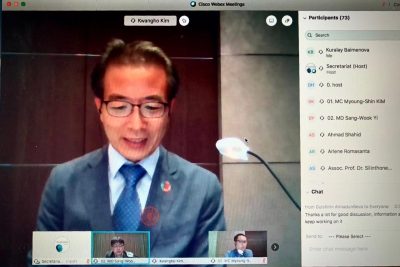The United Nations Educational, Scientific, and Cultural Organization (UNESCO) conducted on online conference on July 23-24 to gather feedback and stake-holder contributions on their new Ethics in Artificial Intelligence initiative.
The event was initiated by the UNESCO General Conference at its 40th session, which authorized the preparation of a formal UNESCO Recommendation document for the purpose of guiding national policy development and compliance measures related to the development and use of Artificial Intelligence technologies.
The draft Recommendation was prepared by the Ad Hoc Expert Group (AHEG), as constituted by the Director-General, in alignment with the principles of the United Nations organizations, and then circulated to member states for review and comment.
The event was hosted by the Republic of Korea, with representatives from more than 20 countries of the Asia-Pacific Region involving more than 100 participants from organizations such as government agencies, research universities, and scientific institutes devoted to AI.
The ISSAI delegation, Prof. Michael Lewis and Kuralay Baimenova, participated as the representative of the RoK, in the capacity as the designated national research institute for AI. ISSAI members were quite active during the event, with scheduled presentations, comments, written contributions, and the submission of the ISSAI Ethical Principles document as a sample of organizational AI Ethics statements.
Among the observations contributed by ISSAI during the two-day event were:
- the continuum of decision-making present in autonomous decision-making systems was not fully reflected in the UNESCO document;
- autonomous decision-making is done in ways that may not be discernible or explainable, thus raising issues of attribution, responsibility, and accountability;
- AI applications may unintentionally embed or amplify existing social divisions, as an example, recent analysis of recommender tools in social media demonstrate this tendency;
- the benefits of AI should be accessible to all, not captured by the few;
- to these ends, citizens should have equal access via modern infrastructure and interfaces;
- awareness should exist regarding the impact of AI on various economic sectors, and employment in those sectors, as the potential exists for socially and economically disruptive change;
- AI systems should observe human rights and human dignity, and the privacy and security of personal data;
- The increasing dependence of humans on AI-enabled technology may gradually erode human skills and abilities, and potentially affect state of mind as part of increasing levels of human-machine interaction;
- the national flagship university of Kazakhstan now includes a compulsory course on Ethics, required of all students;
- the UNESCO initiative should collect exemplar national and organizational statements on Ethics in AI, and share them with the member states for consultative purposes;
- on this point, ISSAI contributes its statement on AI Ethical Principles.
For those interested, the UNESCO initiative is described here: https://en.unesco.org/artificial-intelligence



